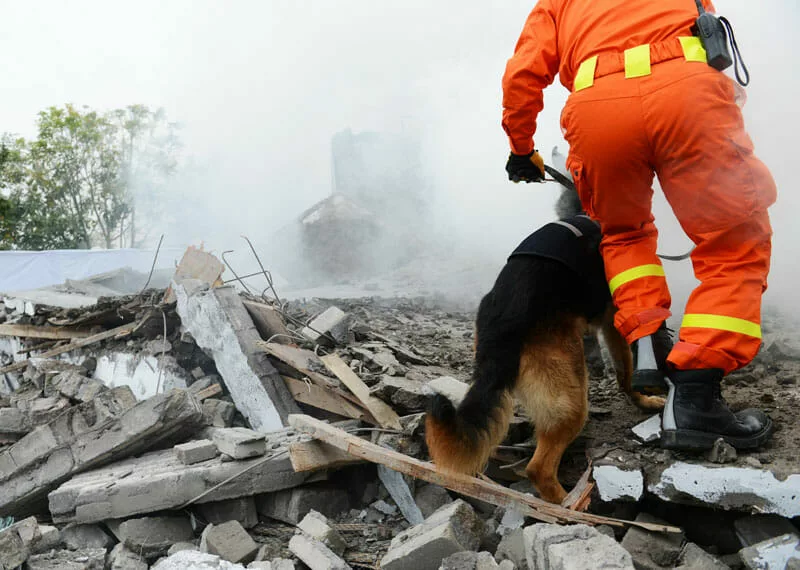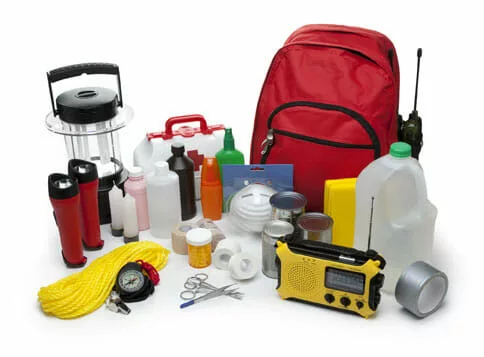
Living in the lower mainland of British Columbia, you’ve no doubt heard that constant narrative about a large earthquake that will cause significant damage to Vancouver and its surrounds: the “big one”. There is good reason for this, of course. Some of the world’s largest and most damaging earthquakes have occurred in or near BC. This includes a magnitude 9 earthquake that happened back in 1700.
However, a more recent earthquake was the 1964 9.2 magnitude event that struck Alaska, which remains the most powerful US earthquake in recorded history, and the second most powerful in the world. This led to a devastating tsunami that smashed its way through Port Alberni, leaving plenty of destruction in its wake. 300 homes and businesses were damaged, yet luckily there were no lives lost in BC.
Incidents such as these shine a light on the importance of earthquake preparedness. This doesn’t mean you have to do emergency drills every day or build an underground bunker, but some general knowledge of what you should do and the insurance you’ll need could go a long way.
Landslide is a disaster in which debris, rocks, or earth moves on a slope causing much damage to life and property.
Earthquake Preparation
Know the Risk

To give you an idea of the prominence of earthquakes in Canada as a whole, there are about 4,000 every single year – that equates to about 11 each day. For BC, research suggests we have a 25% to 30% chance of being hit by a major earthquake in the next 50 years.
With research also showing BC is meant to experience a large earthquake every 200 years, the next big one is already 100 years overdue. When it hits, it could be unlike any other earthquake previously recorded. So a devastating earthquake in BC is not a matter of if, it’s a matter of when.
Like any other natural disaster, preparation is key. First off, you can use this tool by the Institute for Catastrophic Loss Reduction (ICLR) to see how at risk your home is of being affected by an earthquake. You can also keep track of all recent BC earthquakes thanks to Earthquake Track.
Remember that the above tools are just for general reference. At this point in time, scientists have no way of accurately telling when earthquakes will occur, nor what their true severity will be. So while tools such as the one offered by the ICLR are based on historic trends, they’re not to be taken as absolutes.
Responding to an Earthquake
With this in mind, what exactly can you do? Truth is, your best defense comes down to how you respond when an earthquake hits. Annual events such as the Great British Columbia ShakeOut focus on educating all British Columbians on the steps of drop, cover, and hold on (dropping to the floor, getting under any viable nearby cover, and holding on as best you can throughout the duration of an earthquake).
However, sometimes you may not be near cover that could protect you from falling debris. If you’re out in the open, it’s best to stay away from any tall trees or buildings, as the severity of the earthquake could cause these to collapse partially or entirely.
In the event of an earthquake, it’s not just the moving earth you have to account for. As was illustrated by the Port Alberni tsunami, earthquakes can trigger other natural hazards. If possible, you should try to keep away from lower-lying areas where tsunami waters could flood. Aim for higher areas such as hills or even nearby mountains. Don’t forget that power lines could fall, and fires or explosions could occur.
With an earthquake, the mission should not be to try and salvage valuables, but to stay safe. If you can, take cover in a secure area or keep your distance from skyscrapers and large trees. Wherever you find a safe area, remain there until the seismic activity ceases. Listen to news updates and emergency prompts. If segments of the ground open up, stay away from them. While curiosity is understandable, it can also be fatal if you get too close.
Prepare an Emergency Kit
Another imperative step is to build an emergency kit. Whether it’s an earthquake or another natural disaster, an emergency kit can and should be built to sustain you for up to 72 hours. Key items, as identified by the BC government, include:
- Food (ready to eat/non-perishables) and water (preferably store-bought bottled water)
- Flashlight and batteries
- AM/FM radio
- Essential medications
- Seasonal clothing
- Blanket
- Cell phone charger
- Pen and notepad
- Personal toiletries
- First-Aid kits
- Extra pair of glasses or contacts, if applicable
- Cash in small bills
- Local map with your family meeting place identified
- Whistle
Check out this short video on how to build an emergency kit
You should have two variations of the emergency kit. One to be kept at home, which can include a larger First-Aid kit; and one for on-the-go (e.g. stored in your car), which should include a more compact First-Aid kit. Depending on how many people live with you, you may need to make several emergency kits.
In terms of water, a general rule is four litres of water per person for each day. However, keep the following variables in mind:
- Children, nursing mothers, and sick people may need more water to maintain hydration
- If the region of BC you live is particularly warm and/or humid, you may need to double your amount of consumable water
- If you have any pets, you need to account for their water needs, too. The average-sized cat or small-sized dog requires about half a cup daily.
You can estimate what your may need by the following formula: 30 milliliters of water per kilogram of body weight per day. So if you have a larger dog weighing in at 50 kilograms, you’d take 30 milliliters, multiply it by 50, and get 1500 milliliters. 1.5 litres.
Earthquake Insurance
It’s important to remind yourself of the fact that not all insurance policies are created equal. So what one insurer may cover under a specific policy may not be covered as extensively by another insurer. A few insurance companies, for example, may include earthquake damage under a home insurance policy, while many others may not.
Insurer A provides the following: home insurance includes cover for damages to your home and belongings that were caused by an earthquake. However, this only refers to damage resulting from fire, smoke, or explosions in the wake of an earthquake. To have any other forms of earthquake-related damage covered, you must take out an additional policy.
Insurer B does not cover damage caused by earthquakes in your home insurance policy. Instead, you must take out an additional policy such as Earthquake Cover. Such a policy could also include other benefits such as providing you with money to cover the costs of living elsewhere while your home or dwelling is repaired.
It’s these variations in coverage that you need to be mindful of. And even though insurer B may not provide any type of earthquake cover in your default home insurance policy, an extra such as Earthquake Cover may not be that expensive to add on. That’s why shopping around and considering all of your options is worth the effort.
Other Variables
As a quick note, don’t forget about other possible factors or variables that can affect your insurance. The first is under-insurance. As the name suggests, under-insurance is when the amount of damage you claim against your home from an earthquake is not adequately covered by your policy. If your policy covers up to $500,000 of damage but you’ve suffered damages exceeding that number, then any difference will have to come out of your pocket.
Also be aware of deductibles. Essentially, a deductible is the amount you have to pay before an insurance policy kicks in. For example, you have insurance cover equal to $500,000 but it comes with a $4,000 deductible. Your claim would have to exceed a value of $4,000 before any insurance would kick in, and you would always have to cover that $4,000 deductible yourself.
Deductibles are common with earthquake insurance. The reason being that, while they may be rare, earthquakes can damage thousands of homes, businesses and vehicles in one fell swoop. If no deductibles were in place, insurance companies would have to pay out astronomical amounts of money to every individual who makes a claim. By having a deductible in place, it reduces these costs and helps prevent an extreme rise in premiums down the road. So make sure you always have the value of your deductible saved away.
Stay Protected
You cannot stop earthquakes, but you can insure your home, belongings, and vehicles for them. On your own end, you can be prepared by knowing how to respond to them. Don’t risk your life trying to grab items you’re concerned about being destroyed – that’s what your insurance is for.
To protect your home, business, vehicles, family and yourself when BC’s next big earthquake hits, make sure you have the right insurance. AMC Insurance can help you find the very best policies at the most competitive prices. To find out more, call us at +1-866-350-8555 or request a quote
